I love to read. I find it helpful to summarize my thoughts on each book and I offer those thoughts in the hope that you will be encouraged to either read or pass over the given title.
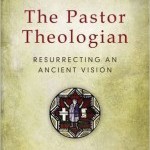 The Pastor Theologian: Resurrecting an Ancient Vision by Gerald Hiestand and Todd Wilson. I must say from the start, “This is a magnificent book!” It will undoubtedly be very high on my favorites reads of 2015. Whatever high expectations I had were well surpassed as the authors promote a compelling vision for recovering the long hallowed, but now forgotten, role of the pastor theologian. Full of piercing historical and sociological analysis, rich reflection on God’s word, and surprisingly helpful tips, this is a book every pastor should read. Not all of us will become Ecclesial Theologians (the true burden of Wilson and Hiestand’s model), yet we all need fresh encouragement to zealously pursuing a learned ministry. Tolle lege!
The Pastor Theologian: Resurrecting an Ancient Vision by Gerald Hiestand and Todd Wilson. I must say from the start, “This is a magnificent book!” It will undoubtedly be very high on my favorites reads of 2015. Whatever high expectations I had were well surpassed as the authors promote a compelling vision for recovering the long hallowed, but now forgotten, role of the pastor theologian. Full of piercing historical and sociological analysis, rich reflection on God’s word, and surprisingly helpful tips, this is a book every pastor should read. Not all of us will become Ecclesial Theologians (the true burden of Wilson and Hiestand’s model), yet we all need fresh encouragement to zealously pursuing a learned ministry. Tolle lege!
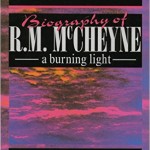 Robert Murray McCheyne: A Burning Light by Alexander Smellie. Out of all the M’Cheyne biographies I’ve read Smellie’s might just be the best one after Andrew Bonar’s classic. Written in the early 20th century Smellie’s account benefits from simultaneously being near enough to interview some who knew Mr. M’Cheyne and having enough historical distance to provide pointed analysis. Smellie’s pen is also up to the task of the great Scotsman; he eloquently says of M’Cheyne’s preaching, “There was pathos in it; there was winningness; there was fire.” This is stirring stuff.
Robert Murray McCheyne: A Burning Light by Alexander Smellie. Out of all the M’Cheyne biographies I’ve read Smellie’s might just be the best one after Andrew Bonar’s classic. Written in the early 20th century Smellie’s account benefits from simultaneously being near enough to interview some who knew Mr. M’Cheyne and having enough historical distance to provide pointed analysis. Smellie’s pen is also up to the task of the great Scotsman; he eloquently says of M’Cheyne’s preaching, “There was pathos in it; there was winningness; there was fire.” This is stirring stuff.
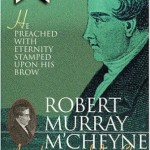 Robert Murray M’Cheyne: A Good Minister of Jesus Christ by J.C. Smith. Smith’s entry into the cottage industry of M’Cheyne appreciation is quite scattered. He spends more time collecting stories about M’Cheyne from contemporaries than giving a linear account of the pastor’s life. But what is surely a drawback to most readers is a gift to M’Cheyne students like myself. For here we have documented eyewitness experiences and firsthand accounts of the man’s power in preaching, prayer, and pastoral ministry. A goldmine indeed.
Robert Murray M’Cheyne: A Good Minister of Jesus Christ by J.C. Smith. Smith’s entry into the cottage industry of M’Cheyne appreciation is quite scattered. He spends more time collecting stories about M’Cheyne from contemporaries than giving a linear account of the pastor’s life. But what is surely a drawback to most readers is a gift to M’Cheyne students like myself. For here we have documented eyewitness experiences and firsthand accounts of the man’s power in preaching, prayer, and pastoral ministry. A goldmine indeed.
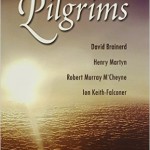 They Were Pilgrims by Marcus Loane. I had never heard of Loane before picking up this book, but have since found out he was a formidable figure in the mid-20th century Reformed world. They Were Pilgrims is a delightful “Banner-of-Truthy” (let the learned understand) book consisting of four biographical portraits: David Brainerd, Henry Martyn, Robert Murray M’Cheyne, and Ion Keith-Falconer. Each man died around the age of thirty, burning out with a missionary zeal. Under Loane’s able hand each man’s zeal for Jesus and His salvation bleeds through each page. Readers beware: the lives and ministry of these humble men just might be what the Spirit uses to ignite a white-hot, fast-burning flame in your life.
They Were Pilgrims by Marcus Loane. I had never heard of Loane before picking up this book, but have since found out he was a formidable figure in the mid-20th century Reformed world. They Were Pilgrims is a delightful “Banner-of-Truthy” (let the learned understand) book consisting of four biographical portraits: David Brainerd, Henry Martyn, Robert Murray M’Cheyne, and Ion Keith-Falconer. Each man died around the age of thirty, burning out with a missionary zeal. Under Loane’s able hand each man’s zeal for Jesus and His salvation bleeds through each page. Readers beware: the lives and ministry of these humble men just might be what the Spirit uses to ignite a white-hot, fast-burning flame in your life.
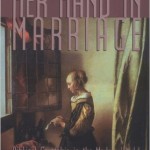 Her Hand in Marriage: Biblical Courtship in the Modern World by Doug Wilson. This book is brief and full of everything one would expect from the “Moscow, Idaho Man.” He is unrelenting in his call for parents to take a biblical role in the relationships of their children. The idea of “courtship” connotes lots of crazy things with modern Christians, but I found Wilson’s vision to be utterly compelling and needed. The simple statement, “Boys leave for marriage, and girls are given in marriage,” may reshape some parent’s view of the whole business. If you take anything away from the book it ought to be a re-centering of children’s relationships around the wise, loving authority of the father. You may read it and disagree, but that’s just fine—Wilson is always good for stirring up convictional conversations.
Her Hand in Marriage: Biblical Courtship in the Modern World by Doug Wilson. This book is brief and full of everything one would expect from the “Moscow, Idaho Man.” He is unrelenting in his call for parents to take a biblical role in the relationships of their children. The idea of “courtship” connotes lots of crazy things with modern Christians, but I found Wilson’s vision to be utterly compelling and needed. The simple statement, “Boys leave for marriage, and girls are given in marriage,” may reshape some parent’s view of the whole business. If you take anything away from the book it ought to be a re-centering of children’s relationships around the wise, loving authority of the father. You may read it and disagree, but that’s just fine—Wilson is always good for stirring up convictional conversations.
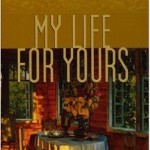 My Life for Yours: A Walk through the Christian Home by Doug Wilson. It took me a while to “get” what Wilson was up to in My Life For Yours. As the subtitle indicates, Wilson walks the reader through a Christian home and meditates on whatever major theme is present in the given room. So, when he comes to the Living Room he speaks of humility and holidays, the Dining Room calls to mind idolatry and food, and the sight of an Entertainment Center gets him going on worldliness. Almost no stone related to the Christian home goes uncovered in this excellent little book. It would be a good tool for discipling church members to use their home for the glory of God.
My Life for Yours: A Walk through the Christian Home by Doug Wilson. It took me a while to “get” what Wilson was up to in My Life For Yours. As the subtitle indicates, Wilson walks the reader through a Christian home and meditates on whatever major theme is present in the given room. So, when he comes to the Living Room he speaks of humility and holidays, the Dining Room calls to mind idolatry and food, and the sight of an Entertainment Center gets him going on worldliness. Almost no stone related to the Christian home goes uncovered in this excellent little book. It would be a good tool for discipling church members to use their home for the glory of God.
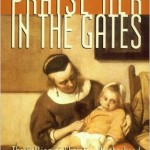 Praise Her in the Gates: The Calling of Christian Motherhood by Nancy Wilson. Having finished reading every Family Series entry from Doug, I ventured over to read those written by his wife. Reading such books help me understand my wife and, I hope, better ministry to the women in my church. Wilson says, “Building a home—childbirth, education, discipline—requires holy joy and a love of beauty. The mother who fears God does not fear the future.” And all God’s people said, “Preach!” Although her literary pen isn’t as potent as her husband’s it is mighty clear nonetheless. Praise Her in the Gates represents Mrs. Wilson’s splendid and short manifesto on motherhood. She hits all the necessary parts with biblical sensibility and without belaboring the point. Her chapters on “The Church as Mother,” “Loving the Kids,” and “The Pleasant Home” will encourage mothers across the spectrum. This would be an excellent book for a few mothers to walk through and encourage each other in the high calling of motherhood.
Praise Her in the Gates: The Calling of Christian Motherhood by Nancy Wilson. Having finished reading every Family Series entry from Doug, I ventured over to read those written by his wife. Reading such books help me understand my wife and, I hope, better ministry to the women in my church. Wilson says, “Building a home—childbirth, education, discipline—requires holy joy and a love of beauty. The mother who fears God does not fear the future.” And all God’s people said, “Preach!” Although her literary pen isn’t as potent as her husband’s it is mighty clear nonetheless. Praise Her in the Gates represents Mrs. Wilson’s splendid and short manifesto on motherhood. She hits all the necessary parts with biblical sensibility and without belaboring the point. Her chapters on “The Church as Mother,” “Loving the Kids,” and “The Pleasant Home” will encourage mothers across the spectrum. This would be an excellent book for a few mothers to walk through and encourage each other in the high calling of motherhood.
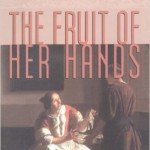 The Fruit of Her Hands: Respect and the Christian Woman by Nancy Wilson. I’m not sure if there’s much I can say about this one as it’s overwhelmingly about wives respecting their husbands. I think Praise Her in the Gates is more useful and pithy, but The Fruit of Her Hands will surely be of use to women desiring to honor the Lord in marriage. I’m still waiting for my wife to finish it and let me know what she thinks. Until then, I’ll just mosey on over to a corner of Recent Reads where I better belong . . .
The Fruit of Her Hands: Respect and the Christian Woman by Nancy Wilson. I’m not sure if there’s much I can say about this one as it’s overwhelmingly about wives respecting their husbands. I think Praise Her in the Gates is more useful and pithy, but The Fruit of Her Hands will surely be of use to women desiring to honor the Lord in marriage. I’m still waiting for my wife to finish it and let me know what she thinks. Until then, I’ll just mosey on over to a corner of Recent Reads where I better belong . . .
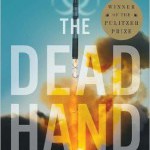 The Dead Hand: The Untold Story of the Cold War Arms Race and Its Dangerous Legacy by David Hoffman. I’ve long fancied that in another life I’d be some type of super spy or intelligence agent—think Jason Bourne. So naturally my outlet for such silliness has been studying the Cold War, those golden decades of espionage. Yet, as time has gone on I find myself increasingly fascinated by the politics of the age as well. When I thus saw David Hoffman’s Pulitzer winner on the untold story of nuclear arms race I knew I had to pick it up. What a fantastic work of scholarship and narrative history! If only every award winner had such verve in telling its story. I never knew how close the world came to nuclear meltdown in the 1980s. Additionally, the fall of the Soviet Union has a new depth of meaning after reading this one. Hoffman’s portraits of Reagan and Gorbachev are most illuminating. The Dead Hand is essential reading for any armchair historian—or professional historian, for that matter–of the Cold War.
The Dead Hand: The Untold Story of the Cold War Arms Race and Its Dangerous Legacy by David Hoffman. I’ve long fancied that in another life I’d be some type of super spy or intelligence agent—think Jason Bourne. So naturally my outlet for such silliness has been studying the Cold War, those golden decades of espionage. Yet, as time has gone on I find myself increasingly fascinated by the politics of the age as well. When I thus saw David Hoffman’s Pulitzer winner on the untold story of nuclear arms race I knew I had to pick it up. What a fantastic work of scholarship and narrative history! If only every award winner had such verve in telling its story. I never knew how close the world came to nuclear meltdown in the 1980s. Additionally, the fall of the Soviet Union has a new depth of meaning after reading this one. Hoffman’s portraits of Reagan and Gorbachev are most illuminating. The Dead Hand is essential reading for any armchair historian—or professional historian, for that matter–of the Cold War.
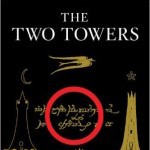 The Two Towers by J.R.R. Tolkien. My journey through Middle Earth continued with The Two Towers. As I said last week, it’s been about thirteen years since I last ventured upon these hallow grounds and many of the intricacies had been forgotten. For example, I hadn’t remembered—I blame it on Peter Jackson, of course—how compartmentalized the original narrative is. Tolkien doesn’t weave the separate stories of the broken Fellowship together, instead choosing to tell each one’s part in full before moving on to the next. I’m pleased to tell you the Battle of Helm’s Deep is still passionate and heroic, and the last march of the Ents remains a joy to behold.
The Two Towers by J.R.R. Tolkien. My journey through Middle Earth continued with The Two Towers. As I said last week, it’s been about thirteen years since I last ventured upon these hallow grounds and many of the intricacies had been forgotten. For example, I hadn’t remembered—I blame it on Peter Jackson, of course—how compartmentalized the original narrative is. Tolkien doesn’t weave the separate stories of the broken Fellowship together, instead choosing to tell each one’s part in full before moving on to the next. I’m pleased to tell you the Battle of Helm’s Deep is still passionate and heroic, and the last march of the Ents remains a joy to behold.
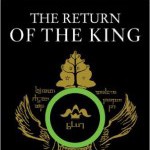 The Return of the King by J.R.R. Tolkien. One thing that must be said about the Jackson versions of LOTR is house stupendous was his job with brave Samwise. For throughout the whole trilogy, and most acutely in The Return of the King, the Gaffer’s son is a model of selfless valor. One can’t read this final volume without feeling stirred by the courage of Frodo, Sam, and their hobbit friends. I confess to getting a teary-eyed as I turned the final page and the Grey Havens came . . . such is my love for this wondrous world of fiction.
The Return of the King by J.R.R. Tolkien. One thing that must be said about the Jackson versions of LOTR is house stupendous was his job with brave Samwise. For throughout the whole trilogy, and most acutely in The Return of the King, the Gaffer’s son is a model of selfless valor. One can’t read this final volume without feeling stirred by the courage of Frodo, Sam, and their hobbit friends. I confess to getting a teary-eyed as I turned the final page and the Grey Havens came . . . such is my love for this wondrous world of fiction.
Click here to find other entries in the Recent Reads series
